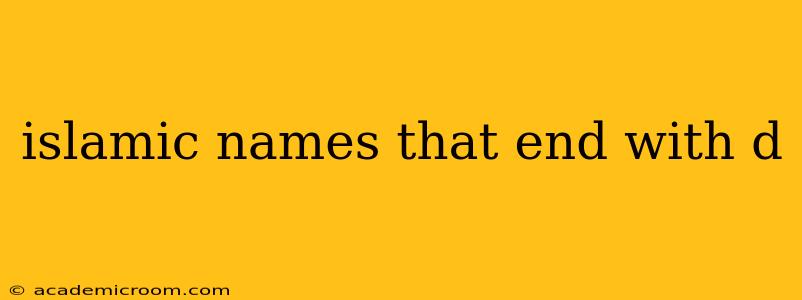Finding the perfect name for your child is a deeply personal and significant decision, especially within the Islamic faith. Many beautiful and meaningful names within the Islamic tradition end with the letter "d". This list explores some of these names, offering insights into their meanings and origins, helping you in your search for the ideal name.
This article considers both male and female names, exploring their origins and cultural significance within the broader Islamic world. We'll also address some frequently asked questions to help you make an informed choice.
What are some popular Islamic names ending in "d"?
Several names ending in "d" are popular choices among Muslim parents. Popularity, of course, can vary regionally, but some consistently appear across various Islamic cultures. Examples include:
-
For boys: While fewer traditionally Islamic names for boys end in "d", names adapted from other languages and cultures but commonly used in Islamic communities might include names similar in sound or ending with the sound of "d". Researching names with similar sounds and then checking their appropriateness according to Islamic principles is always recommended.
-
For girls: There's a richer selection of girls' names ending in "d" with strong Islamic associations. Some examples include: A'ishah (meaning "life", "lively"), and variations of this name. Remember to check the correct spelling and pronunciation as slight variations exist.
Are there any specific meanings associated with names ending in 'd'?
The letter "d" itself doesn't carry a specific inherent meaning in Arabic or Islamic numerology like some other letters might. The meaning is derived entirely from the complete name. Therefore, the significance lies in the overall meaning of the name, not simply its final letter. For example, the meaning of "A'ishah" is entirely independent of the "h" sound.
How can I choose the best name for my child from this list?
Choosing a name is a deeply personal matter. Consider these factors:
- Meaning: Research the meaning thoroughly. Does it align with your values and beliefs?
- Pronunciation: Ensure the name is easy to pronounce and understand in your cultural context.
- Cultural significance: Consider the name's relevance and acceptance within your family and community.
- Future implications: Think about how the name might sound and be perceived as your child grows older.
Where can I find more information on Islamic baby names?
Numerous resources exist online and in print dedicated to Islamic baby names. These often include comprehensive lists, detailed meanings, and origins of names. Referencing multiple sources is always advisable to ensure accuracy.
What are some less common Islamic names ending in 'd'?
Less common names offer a unique and distinctive choice. However, thorough research into their meaning and appropriateness within Islamic tradition is crucial before selection. To find these less common names, you may need to explore specialized books or websites dedicated to Islamic names and their origins.
Choosing a name for your child is a sacred act. This guide offers a starting point; remember to conduct your own detailed research to ensure you select a name that is both beautiful and meaningful within the context of your faith and family.
